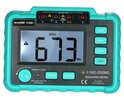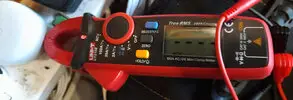Yes I had two rather old RCD's and resetting one would often trip the other one, there have been claims by some manufacturers to have cured the problem, seem to remember the Eaton X-Pole was one, and included a warning device to show when getting near to the tripping current.
Today we seem more aware of types of RCD, the AC seems to have now nearly gone, although all my RCBO's are type AC even when they said type B on the box. In the main we used type A, there is also type F and B. The types are because some equipment can either inhibit them tripping or make them more sensitive.
I used an oscilloscope in university, but it is not really as yet part of the electricians tool kit, my test was to measure the loop impedance, if the RCD tripped then must be close to the limit, as the tester used 9 mA to test, so if it held in, I knew I had 9 mA to spare.
What we should do is measure each circuit and the tripping current should be less than 1/3 of the RCD rating, so for a 30 mA 9 mA is the limit, however only in the last year have I had a clamp on ammeter which could measure that. My clamp on before that only measured down to 0.01 amp.
Back in 2008 the regulations said "Every installation shall be divided into circuits, as necessary, to reduce the possibility of unwanted tripping of RCDs due to excessive protective conductor currents produced by equipment in normal operation." but people were still fitting duel RCD consumer units, it also said "avoid hazards and minimise inconvenience in the event of a fault" and so one should not have lights and sockets on the same circuit, but people seem to want to read into the regulations what they want to do.
"
Circuit. An assembly of electrical equipment supplied from the same origin and protected against over current by the same protective device(s)." "
Residual current device (RCD). A mechanical switching device or association of devices intended to cause the
opening of the contacts when the residual current attains a given value under specified conditions." it seemed plain to me back in 2008 that a RCD formed a circuit, so the rules on dividing the installation into circuits was applied to RCD's back in 2008, however people selected not to read the regulations that way. Seems electricians taught about electrics, but not so much on English comprehension a subject I hated at school.
But down to nitty gritty and it's price, we weigh up the cost of a freezer full of food against the price of fitting all RCBO's and many home owners seem to prefer to take a chance if it trips they will find it in time so food not lost, so we are talking about risk assessment. The problem is who pays, loose a freezer full of food, and we claim off insurance, also it is up to the home owner, not the electrician, this has been made plain with the SPD (surge protection device) it is not required for safety, it is required to stop damage to electronic devices connected direct to the mains supply, so the home owner can elect to take the risk.
The rub comes in that the electrician needs to explain to the home owner the risk, and to be frank I am not sure what the risk is, so how can I tell Joe public what the risk is? Default is fit one, but if the home owner says no, then we don't need to fit one. So the same splitting the installation into more or less circuits, I lived in a caravan at one point and all went through one RCD, but to be fair lights were 12 volt from a battery, and the reason we have leakage is AC can transfer by inductive and capacitive linking, so the more cable used the greater the leakage, and a caravan is small. It also means the insulation tester

only shows faults, as it tests with DC, to measure back ground leakage we need the clamp on ammeter

and I have already admitted up until 12 months ago I could not have tested how much earth leakage there was as my meter did not measure that low, and a normal ammeter is no good as can't measure the difference between line and neutral.
We should according to the IET have an EICR done every 10 years, the government requires every 5 years with rental property, but I know I have not fully tested this house, OK I will retest any circuit I have worked on, but I have only really tested my own house to show my son how it is done. He is now also an electrician.
So the big question, are you prepared to pay for all RCBO's to be fitted? Seem to remember when I got the bits for my son to fit for me, cost around £300 and that is without labour costs of course, with a consumer unit change it will cost around £200 extra to have all RCBO's which is less than a freezer full of food, but once changed to then swap to all RCBO it is going to cost more like £800, so is it worth it? As said it is a risk assessment.



